In today’s tech-savvy world, our traditional methods are evolving, even how we study religious texts. **Spirituality has embraced AI**, especially through AI-powered Bible study apps, creating a groundbreaking experience for users. There are many Bible apps now that use AI to offer a **personal and deep dive into scriptures**. These apps create customized Bible reading plans, ask thought-provoking questions, and even offer pastoral advice.
We recognize that AI can serve as a complementary tool, supporting our understanding of the Bible from diverse perspectives. Leveraging large language models, AI applications for Bible study attempt to provide a more neutral viewpoint. We see value in how these applications engage with the text, generate reflections, and offer interpretations that might be overlooked during personal study.
Our exploration of the best AI Bible apps aims to understand their effectiveness in enhancing one’s faith journey. We scrutinize their ability to provide accurate biblical knowledge, maintain theological integrity, and integrate seamlessly into daily life. Their impact on both personal devotion and academic study could potentially introduce a new era of engaging with sacred texts.
Best AI Bible Apps
#1 Bible Chat
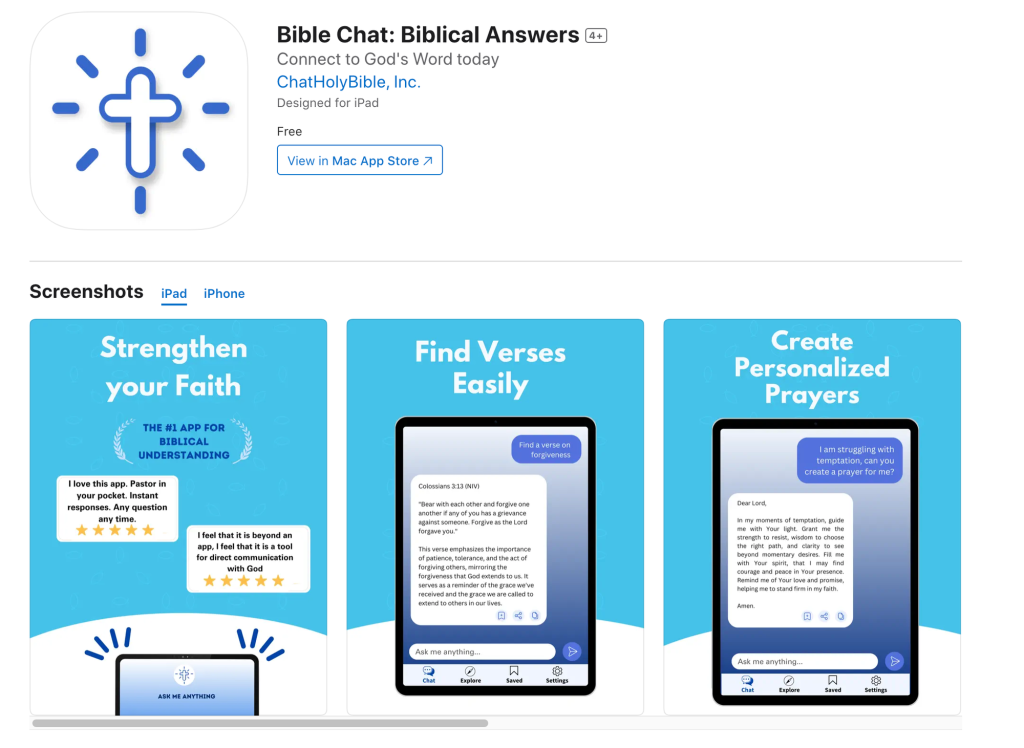
Biblical Answers is a revolutionary iOS app that stands out among other Bible apps for its unique ability to answer your questions about the Bible using advanced artificial intelligence.
This groundbreaking app is the perfect tool for anyone seeking to deepen their understanding of the Scriptures and apply biblical wisdom to their daily lives. What sets Bible Chat apart is its cutting-edge AI technology, which has been trained to comprehend the Bible’s contents and context. Users can simply type in their questions, and the app will provide relevant, accurate answers straight from the Scriptures.
Whether you’re curious about a specific verse, looking for guidance on a particular topic, or seeking to understand complex theological concepts, Bible Chat has you covered. One of the most impressive aspects of Bible Chat is its ability to provide answers that are firmly grounded in the Scriptures. This commitment to biblical accuracy sets Bible Chat apart from other apps that may offer more general or opinion-based answers.
#2 Dwell Audio Bible
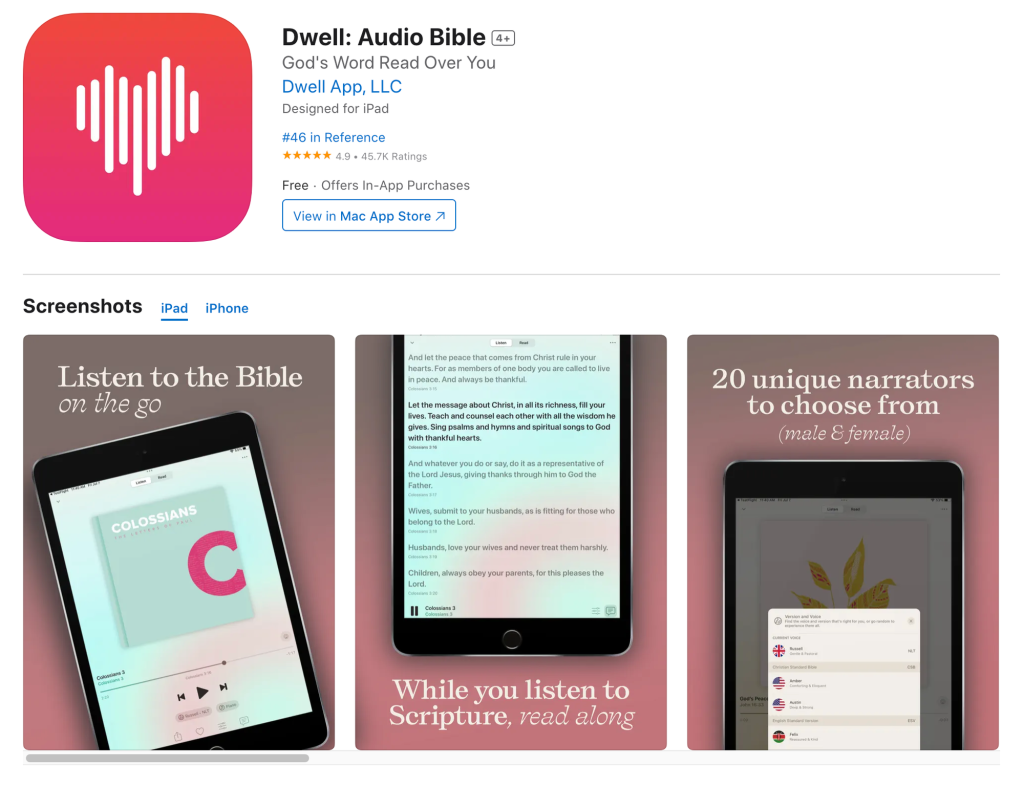
Dwell distinguishes itself with its emphasis on delivering an exceptional Bible audio experience. It boasts a selection of narrators and specially composed background music designed to elevate the listening experience.
The app provides organized playlists and auditory plans that lead users through various biblical themes and books. Its innovative method of offering the Bible in audio form is perfect for listeners who favor auditory learning.
With its intuitive design and modern aesthetics, Dwell appeals to contemporary users looking for a new way to connect with the Bible. It is an ideal companion for meditative and reflective practices while on the move.
Download Now#3 Bible App
The Olive Tree Bible App serves as an all-encompassing resource for profound Bible study. It provides a wide range of translations, audio options, and daily study schedules. Additionally, the app features tools for studying original Greek and Hebrew texts, alongside study Bibles, extensive commentaries, and maps. With its intuitive interface and comprehensive offerings, it’s perfectly suited for diligent Bible scholars.
The app allows users to tailor their study journey with a variety of tools and resources at their disposal. For those seeking to deepen their Bible knowledge or discover new perspectives, this app offers abundant resources.”
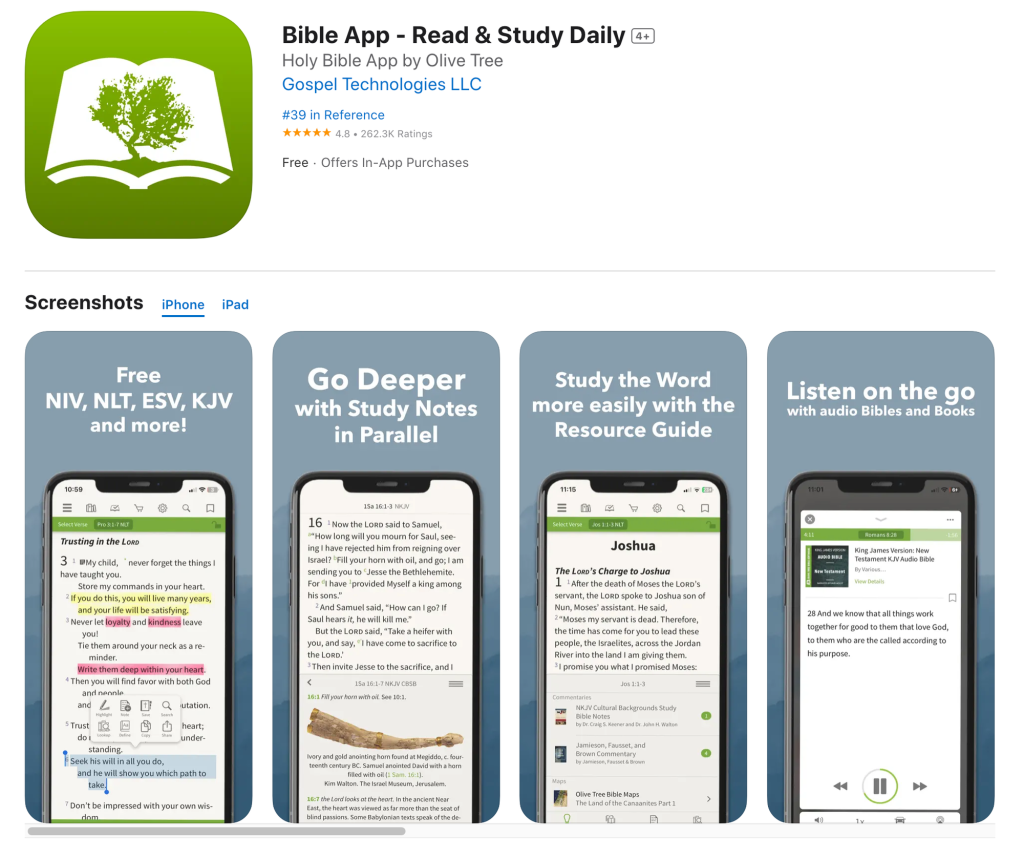
#4 Bible
The Life.Church Bible App is celebrated for its broad impact, boasting millions of installs across the globe. It presents an extensive array of Bible translations in many languages, appealing to an international user base.
The app allows users to engage with the Scriptures by reading, listening, and viewing content, offering a flexible approach to study. Included are functionalities such as verse comparison, the ability to create shareable images, and diverse Bible reading schedules.
With its intuitive layout and engaging features, it stands out as a premier option for those looking for an in-depth Bible study tool. This app caters to all, from novices to experienced Scripture readers, providing resources for every level of interest.”
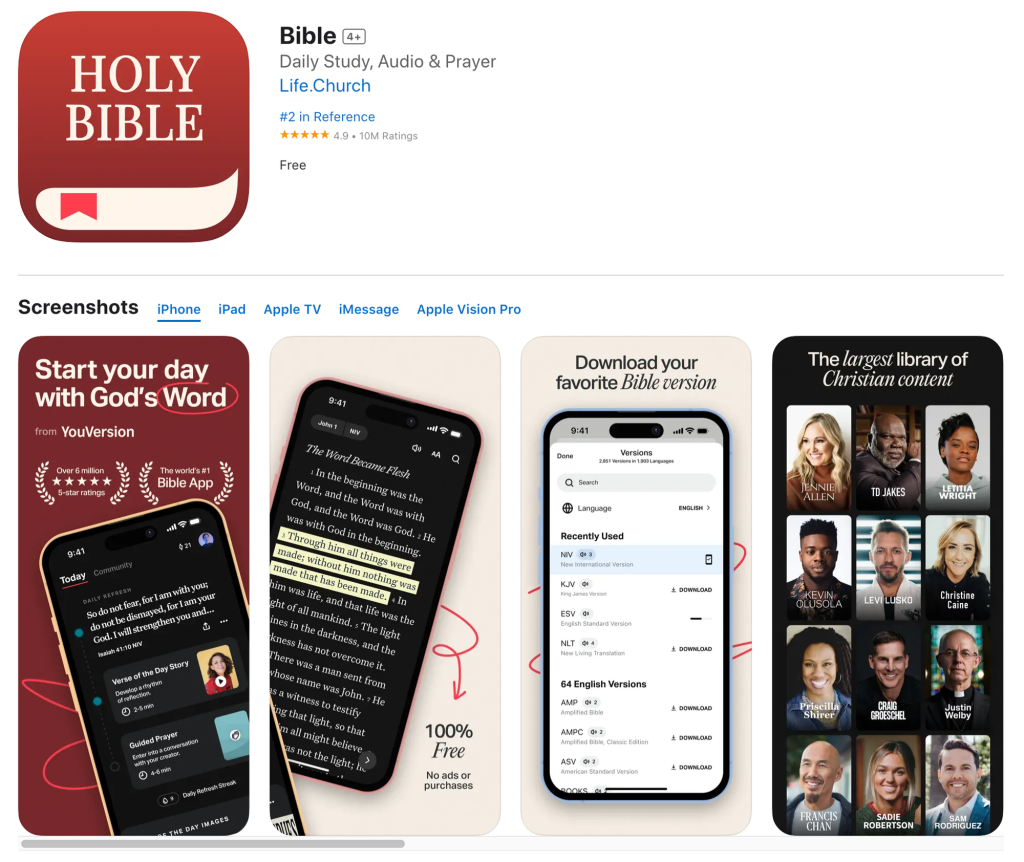
#5 Blue Letter Bible
Blue Letter Bible stands out as an impactful tool for detailed Bible study. It enables users to explore the original Hebrew and Greek scriptures, offering resources like dictionaries, concordances, and explanatory commentaries.
The feature to view various Bible translations side by side provides a distinctive experience for comparative studies. Additionally, the app offers audio versions of the Bible and its commentaries, deepening users’ comprehension. Its comprehensive resources render it a superior option for individuals eager to explore biblical texts more profoundly.
With a concentration on original texts and academic materials, it serves as an indispensable resource for dedicated students of the Bible.
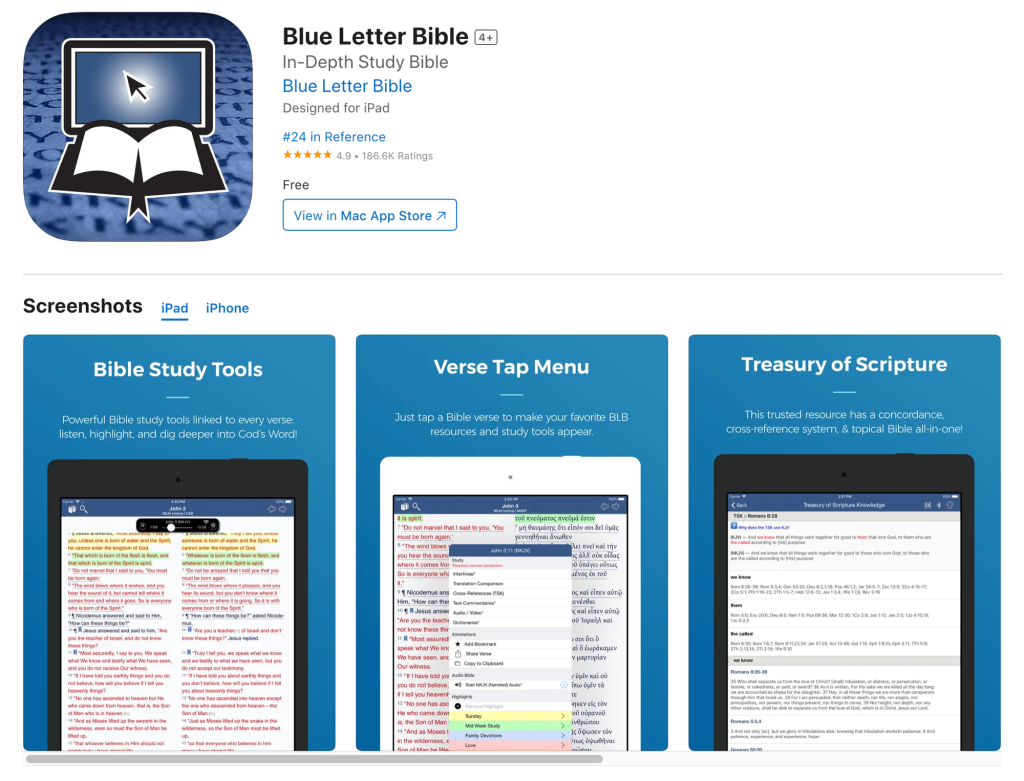
Things to consider:
When we consider the concept of artificial intelligence (AI) in a biblical context, it is essential to distinguish the technological reality from theological perspectives. AI refers to machines designed to simulate human intelligence. From a biblical standpoint, it raises questions on stewardship, creativity, and the nature of intelligence itself.
Key Questions:
- How do we reconcile AI with divine wisdom?
- Is there a biblical premise for creating or using AI?
In examining scriptural foundations, we first admit that the Bible does not directly address modern technology, including AI. However, we draw from biblical principles to form our understanding. For instance, Genesis 1:28 commands us to steward the earth, implying the responsible use and development of resources and tools. AI, as a tool, can fit within this mandate when used ethically and for the betterment of society.
We also reflect on the image of God (Imago Dei), as humans are created in it (Genesis 1:27). While AI can mirror aspects of human cognition, it lacks the divine imprint that endows human beings with their intrinsic worth and relational capacities.
Ethical Considerations:
- Responsible innovation (Proverbs 3:13-14)
- Potential for idolatry (Exodus 20:3-4)
- Impacts on human dignity (Psalm 8:5)
In conclusion, when we discuss AI in a biblical context, we navigate a complex intersection of faith, ethics, and technology, striving to harness AI’s potential while upholding scriptural tenets and human value.
AI Bible Software and Applications
In our digital age, AI Bible software and applications bring innovative approaches to biblical studies, offering users enhanced experiences through AI-assisted study tools, advanced language processing, and machine learning techniques to delve deeper into Scripture.
AI-Assisted Bible Study Tools
We have seen the advent of AI-assisted study projects that positively impact personal Bible study, generating questions and devotional prayers tailored to each Bible chapter. Such tools aid us in considering aspects of our spiritual life we might overlook. For example, we might encounter AI-generated questions that challenge us to think about the impact of even the most mundane aspects of life, like our possessions, on our spiritual wellbeing.
- Personalized Questions: AI generates context-relevant questions for reflection.
- Devotional Prayers: Custom prayers are created to accompany Scripture reading.
Language Processing for Scripture Analysis
Advanced language processing gives us the ability to analyze scripture in new ways. We can leverage machine learning algorithms to detect patterns, themes, and even sentiment within Biblical text. It means that not only can we dissect complex scriptural passages, but we also gain insights into the subtler nuances of the original languages.
- Textual Patterns: Detecting themes and recurring elements in Scripture.
- Semantic Analysis: Understanding the context and meaning of words in the Bible.
Machine Learning in Biblical Research
Our commitment to using machine learning in biblical research amplifies our capabilities to sort, categorize, and understand Biblical data on a grand scale. We apply these technologies to compare textual variants, forecast trends in Biblical scholarship, and even predict unrecognized connections between different passages or concepts in the Bible.
- Comparative Studies: Machine learning aids in comparing scripture variations.
- Predictive Analysis: Anticipating connections and insights within Biblical studies.
Ethical Considerations of AI in Religion
As we explore the integration of AI into religious contexts, it is imperative to address the ethical considerations that safeguard human dignity and religious tenets.
Moral Implications of AI Interpretations
The immersion of AI into religious studies raises crucial questions regarding the moral implications of its interpretations. AI does not possess human intuition or empathy, which are fundamental in understanding the nuanced and deeply personal aspects of religious texts. When AI interprets scripture, we must critically assess:
- Accuracy: Is the interpretation an accurate reflection of the text’s intended meaning?
- Context: Does the AI consider the historical and theological context of the passages?
Our role is to ensure that these interpretations are reviewed and validated by knowledgeable human authorities to maintain the integrity of the teachings.
Human Oversight in AI Integration
When we integrate AI into religious settings, maintaining strict human oversight is non-negotiable. Such oversight is pivotal for:
- Ethical Boundaries: Setting clear boundaries for AI’s role in spiritual guidance, ensuring it complements rather than replaces human religious leaders.
- Accountability: Establishing who is responsible for the actions and decisions made by AI systems in religious environments.
We must create frameworks that hold AI systems accountable and align them with our core religious values.
Impact of AI on Theological Discourse
Artificial Intelligence (AI) is reshaping theological discourse, offering new tools for education and fostering interfaith dialogue. We explore the nuances of this impact below.
Enhancing Theological Education
AI’s Role in Theological Scholarship:
- Resource Aggregation: AI systems facilitate access to a wide array of theological works, scriptures, and scholarly articles, enabling more robust research.
- Language Capabilities: Advanced language models assist in translating ancient texts, offering theologians insights into the subtle nuances of original languages.
Applications in Learning:
- Interactive Learning: Utilizing AI, educational platforms can create simulations and interactive models that enhance the comprehension of theological concepts.
- Personalized Education: AI algorithms cater to personal learning styles, adapting content to meet the diverse needs of theology students.
AI and Interfaith Dialogues
Fostering Communication Across Faiths:
- Cultural Exchange: By providing accurate translations and explanations of religious texts, AI assists in bridging gaps between different faith communities.
- Dialogue Enhancement: AI-powered forums can host interfaith discussions, ensuring respectful and constructive conversations through moderation.
Deepening Understanding:
- As AI presents theological views from multiple perspectives, individuals gain a multi-faceted understanding of beliefs other than their own. This enriches interfaith dialogues.
Future Directions in AI-Scripture Engagement
We are at the cusp of a new era where artificial intelligence intersects with scriptural studies in ways that could revolutionize both fields. This section explores cutting-edge applications that harness AI to deepen our understanding and dissemination of theological knowledge.
Predictive Analytics for Theology
We utilize predictive analytics to anticipate and address theological questions as they arise in congregational contexts or broader social discourse. By analyzing patterns from historical and contemporary religious texts, we can:
- Identify emergent trends in theological discussions.
- Forecast theological needs of different demographics.
AI in Missiology and Evangelism
In Missiology and Evangelism, we deploy AI to understand cultural contexts better and enable targeted outreach. AI helps us in the following ways:
- Tailoring messages to resonate with diverse audiences.
- Language translation initiatives, making Scripture accessible in every tongue.
Frequently Asked Questions
We have gathered some of the most common questions around the utilization of AI in engaging with the Bible and provided clear, informative answers to enhance your understanding and experience.
What are the benefits of using an AI Bible application for scripture engagement?
AI Bible applications assist in offering personalized scripture reading experiences, allowing for interactive learning and quick answers to biblical questions. They make studying the Bible more accessible and convenient, catering to the needs of users with varying levels of biblical knowledge.
Which AI Bible app offers the deepest insights and most accurate interpretations?
While we cannot endorse a specific AI Bible app as the most effective, apps such as Bible Ai and AgapeChat’s AI Bible Study have been designed to provide deep insights and interpretations by leveraging comprehensive biblical databases and advanced AI algorithms.
How does AI enhance the visual representation of biblical stories and art?
AI can interpret and render biblical stories into compelling visuals, transforming text into dynamic images and art. This allows for a more immersive experience, helping users to visualize ancient settings, characters, and events in a more engaging way.
What innovative features do AI Bible chatbots provide for spiritual growth?
AI Bible chatbots offer features like daily scripture verses, prayer guides, and thematic studies that cater to individual spiritual growth paths. They allow real-time interactions and can address personalized spiritual queries which is beneficial for users looking to deepen their faith.
Can artificial intelligence enhance the experience of studying the Bible with others remotely?
AI can greatly enhance the remote study of the Bible by providing platforms for group discussions, interactive learning, and shared insights. It enables real-time communication and collaboration among users from different locations, making collective study sessions more effective.
Are there any AI platforms that help users better understand the historical context of the Bible?
Certain AI platforms are equipped to provide extensive historical backgrounds on biblical events and characters. They utilize historical data and cultural information to help users gain a deeper understanding of the context within which the Bible was written.





